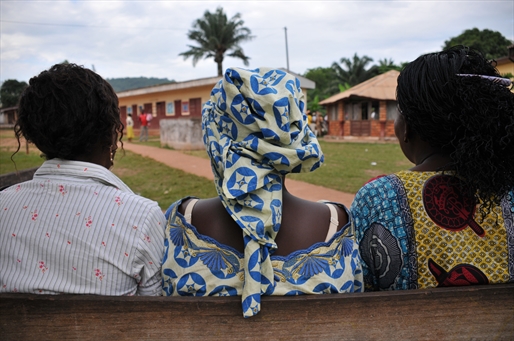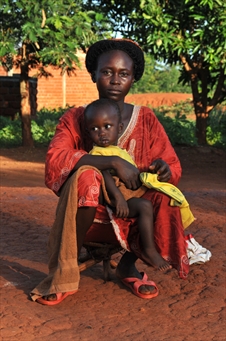
When the Muslim rebels knocked on her door in Bangui, capital of Central African Republic, the woman did not answer. But when they yelled “Open the door or we will blow it open with grenades!” she had no choice. The attackers searched the house for Christian men. When they didn’t find any, they left. The woman thought she had escaped unharmed, but two of them came back, and while one kept watch, the other raped her at gunpoint. Then they destroyed everything in the small shop she had at the front of her house, and left.
Gender-based violence against women and girls happens more and more frequently in places where Christians are under pressure. The European Institute of Gender Equality defines it as violence directed against females because of their gender, or violence that affects women disproportionately. The Nigeria Political Violence Research Network says it includes physical abuse such as sexual assault; psychological abuse such as deprivation of liberty, forced marriage, and sexual harassment; deprivation of resources such as health care, nutrition, and education; and treating them as commodities — commonly known as trafficking.
|
LEARN MORE |
Gender-based violence is one of the most prevalent human-rights violations in the world, and the UN Population Fund estimates it affects one in three women. It knows no social, economic or national boundaries. Violence against women is often used as a tool to punish Christian women for their faith, or to get people to abandon the faith. While no religion can claim to be totally free from this vice, it is a particular issue in countries where Islam dominates.
A broad look at the circumstances of women in Muslim states shows widespread discrimination against them and violations of their basic human rights. But whatever the violence inflicted on women in Muslim countries, it is most severe when specifically imposed on them for religious reasons, says researcher Lela Gilbert in her report, Gender-Based Violence As An Expression Of Christian Persecution In Muslim Lands.
These realities are often aggravated in conflict situations like those faced in Central African Republic and northern Nigeria, where it has been used to the subjugate non-Muslims and force them into Islam as part of something called the Traditional Jihadist Approach.
Central Africa Republic
In December 2012, almost nobody saw the storm coming. Loosely organised Muslim rebel groups joined forces under the name Séléka and started conquering large areas as they marched to the capital to perform a coup. They specifically targeted Christians with assault, looting, rape, and murder. In the years that followed, women remained easy targets. Thousands of women were raped. Gang rape was common.
Many women and girls suffered rape multiple times. When a Séléka commander approached the village where a 12-year-old girl named Chancela lived, most villagers fled. She stayed to care for her sick father. When the “colonel” discovered her, he raped her. The next day he saw her at the market and raped her again. When he came looking for her the third day, she jumped through an open window and ran away.
International forces intervened in CAR in January 2014. The rebel government relinquished power, but insecurity continues in the interior, and reports of violence against women continue to emerge.
Nigeria
The crisis in CAR surprised many, but a deadly insurgency has gripped Nigeria since 2009. The militant Islamic sect Boko Haram has made violence against women an integral part of its strategy to bring northern Nigeria to its knees and impose strict sharia rule.

A mother and child in Central African Republic.
Courtesy Open Doors International
Janada David comes from the Christian enclave of Gulak in northern Adamawa State, which was captured by Boko Haram in September 2014. Apart from the general destruction and murder David witnessed there, she told Open Doors, a charity that provides aid to Christians living under pressure, about the systematic Islamization the women captives faced. She and other women were married off to insurgents and given new names and veils to cover their heads. An Islamic teacher gave them each a kettle and taught them how to do ablution before prayers. Then he taught them the Islamic confession and prayers. Under close supervision they prayed five times a day.
“I found it difficult to perform prayers. I was disturbed within my soul,” David said. “They did not know that I loved Jesus. I could not show it openly because I saw how they killed anyone who did. In my heart I always called on the name of Jesus. I prayed that He would save me from the hands of the insurgents.”
David’s prayers were answered when the army liberated Gulak in November last year.
“Will the Lord ever take me back?” one guilt-ridden victim of such forceful conversion once asked an Open Doors worker.
“Now that Gulak is liberated, I discovered that 44 of my members have been forcefully converted to Islam,” said David’s pastor. “I am spending time with them and we will have a special church service where people can publicly confess and return to Christ.”
Victims
Beyond the physical wounds Open Doors said the trauma has had an immense emotional impact. Victims attending a trauma care seminar in CAR illustrated the shame they felt in pictures they were asked to draw.
“Their artwork expressed intense sadness, anxiety, loneliness, shame, despair, and depression,” said the Open Doors trauma care coordinator for Africa, whose name is being withheld for security purposes. “One picture showed a woman trying to pull out her hair. Another showed a woman with eyes closed, trying to shut out the horrible memories.”
One drawing showed a woman hiding from ridicule. “First they suffer the violence and then they suffer the sinful responses of families to the incident,” the Open Doors worker said. “The Church in neither CAR nor Nigeria has been immune to it.”
Victors
Amid such physical and emotional devastation, caregivers say they can find hope, starting in the Bible, Romans Chapter 5: “Not only that, but we rejoice in our sufferings, knowing that suffering produces endurance, and endurance produces character, and character produces hope, and hope does not put us to shame, because God’s love has been poured into our hearts through the Holy Spirit who has been given to us.”
“We believe there is hope because of those words, but also because we have seen it with our own eyes,” the Open Doors worker said. “After that same group of victims drew those sad pictures, our workers showed them from the Word that our Lord does not look at them the way the community often looks at them. We also helped them understand the symptoms of their trauma, the phases of recovery, and we guided them into spiritual disciplines such as Bible study, prayer, fellowship, and discipleship to help the recovery along.”
Arriving at the training the next morning, OD staff members discovered many of the women singing. They said they realised that they were not alone and they no longer felt isolated. In sharing their stories and pouring out their hearts to God, they felt great relief.
“Victims of violence do not need to be locked away and written off,” the Open Doors worker said. “A little help goes a long way. With the right care, lots of patience and love, and by God’s grace, they can turn from victims into victors.”